Last roundup or first viceroy .. what is the future of tricky Dick Cheney?
Jun 27th, 2007 | By Citizen X | Category: USA Today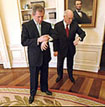 No less a political analyst than Arsenio Hall made the crucial point back at the beginning. He had noticed, he told Jay Leno on TV, that George W. Bush could not talk when Dick Cheney was drinking a glass of water. Half a dozen years later a series in the Washington Post, eerily linked with “Vice President Cheney’s recent declaration that he is not part of the executive branch,” is prompting many to wonder what it all means for American democracy in the 21st century. For extra zest, DC conservative socialite Ms. Sally Quinn is also reporting that the “big question right now” even “among Republicans is how to remove Vice President Cheney from office.” The thought is that Fred Thompson, e.g, would make a good replacement. And: “Cheney is scheduled this summer for surgery to replace his pacemaker, which needs new batteries. So if the president is willing, and Republicans are able, they have a convenient reason to replace him: doctor’s orders.” At this point even up here in the remote true north you do have to wonder just what is going on?
No less a political analyst than Arsenio Hall made the crucial point back at the beginning. He had noticed, he told Jay Leno on TV, that George W. Bush could not talk when Dick Cheney was drinking a glass of water. Half a dozen years later a series in the Washington Post, eerily linked with “Vice President Cheney’s recent declaration that he is not part of the executive branch,” is prompting many to wonder what it all means for American democracy in the 21st century. For extra zest, DC conservative socialite Ms. Sally Quinn is also reporting that the “big question right now” even “among Republicans is how to remove Vice President Cheney from office.” The thought is that Fred Thompson, e.g, would make a good replacement. And: “Cheney is scheduled this summer for surgery to replace his pacemaker, which needs new batteries. So if the president is willing, and Republicans are able, they have a convenient reason to replace him: doctor’s orders.” At this point even up here in the remote true north you do have to wonder just what is going on?
The office of Vice President in American history ..
 The Washington Post has described its recent influential series of articles as “an in-depth investigation of the vice presidency of Dick Cheney, the most influential and powerful man ever to hold the office.” The ABC TV Chief Washington Correspondent (and former Bill Clinton aide) George Stephanopoulos, we have lately been told, has also “examined the controversy surrounding Cheney and pronounced the current vice president the most powerful person to occupy the office in history.”
The Washington Post has described its recent influential series of articles as “an in-depth investigation of the vice presidency of Dick Cheney, the most influential and powerful man ever to hold the office.” The ABC TV Chief Washington Correspondent (and former Bill Clinton aide) George Stephanopoulos, we have lately been told, has also “examined the controversy surrounding Cheney and pronounced the current vice president the most powerful person to occupy the office in history.”
All this, you might say, nicely fits the high-school history textbook truism that the office of Vice President of the USA is not much of a job. Back at the beginning of the present US Constitution in the late 18th century, Benjamin Franklin is said to have proposed that the Vice President be given the title “His Superfluous Excellency.”
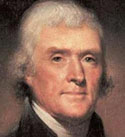 Yet if you have spent even just a little time looking into the history of the office, over the past several days of heightened “controversy surrounding Cheney,” you might be a little surprised. The dead white males who wrote the present US Constitution at Philadelphia had imagined that there would be several candidates for President in any given election, and had not reckoned on the development of an organized party system. The Vice President was effectively to be just the runner-up in the race for President. This system, however, had fallen apart by the fourth presidential election of 1800 – which led to the Twelfth Amendment to the Constitution in 1804, establishing the present system of presidential and vice-presidential party running mates.
Yet if you have spent even just a little time looking into the history of the office, over the past several days of heightened “controversy surrounding Cheney,” you might be a little surprised. The dead white males who wrote the present US Constitution at Philadelphia had imagined that there would be several candidates for President in any given election, and had not reckoned on the development of an organized party system. The Vice President was effectively to be just the runner-up in the race for President. This system, however, had fallen apart by the fourth presidential election of 1800 – which led to the Twelfth Amendment to the Constitution in 1804, establishing the present system of presidential and vice-presidential party running mates.
If you look at a list of historical Vice Presidents as well, you might be struck by just how many of them went on to (sometimes even distinguished) careers as Presidents. Into this category fall John Adams, Thomas Jefferson, Martin Van Buren, John Tyler, Millard Fillmore, Andrew Johnson, Chester Arthur, Theodore Roosevelt, Calvin Coolidge, Harry Truman, Lyndon Johnson, Richard Nixon, Gerald Ford, George H.W. Bush (and, some might want to add, almost Al Gore).
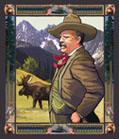 In some of these cases men who were Vice Presidents to boost their resumes, as it were, subsequently became Presidents by being directly elected to that job themselves. Some became Presidents by the death of a sitting President. And some of these were subsequently elected as well. As explained by an official Vice President website of the US Senate: “Of the fourteen vice presidents who fulfilled their ambition by achieving the presidency, eight succeeded to the office on the death of a president, and four of these were later elected president.”
In some of these cases men who were Vice Presidents to boost their resumes, as it were, subsequently became Presidents by being directly elected to that job themselves. Some became Presidents by the death of a sitting President. And some of these were subsequently elected as well. As explained by an official Vice President website of the US Senate: “Of the fourteen vice presidents who fulfilled their ambition by achieving the presidency, eight succeeded to the office on the death of a president, and four of these were later elected president.”
John Tyler was the first Vice President who effectively became President as the result of the death in office of President William Henry Harrison in 1841. (As some may also remember from high school history the pair had run as “Tippecanoe and Tyler too” – though who cares why at this point?) Tyler made more of his accession to the presidential office than some students believe the 18th century Philadelphia framers had intended. And this precedent would later be ultimately followed in (broadly) similar circumstances by Millard Fillmore, Andrew Johnson, Chester Arthur, Theodore Roosevelt, Calvin Coolidge, Harry Truman, and Lyndon Johnson.
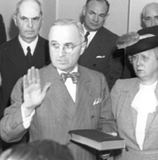 Lyndon Johnson’s accession to the presidency following the tragic shooting death of President John F. Kennedy on November 22, 1963 also raised a number of constitutional questions, which finally led to the Twenty-Fifth Amendment in 1967. This clarified various matters of executive succession, including succession to the office of Vice President if that were to become vacant between elections. And as Akhil Reed Amar has pointed out in his recent magisterial volume of 2005, America’s Constitution : A Biography, the provisions of the Twenty-Fifth Amendment “both clarified and enhanced the constitutional status of the vice president.”
Lyndon Johnson’s accession to the presidency following the tragic shooting death of President John F. Kennedy on November 22, 1963 also raised a number of constitutional questions, which finally led to the Twenty-Fifth Amendment in 1967. This clarified various matters of executive succession, including succession to the office of Vice President if that were to become vacant between elections. And as Akhil Reed Amar has pointed out in his recent magisterial volume of 2005, America’s Constitution : A Biography, the provisions of the Twenty-Fifth Amendment “both clarified and enhanced the constitutional status of the vice president.”
The provisions of the Twenty-Fifth Amendment came into some practical play when Vice President Spiro Agnew resigned in 1973 and was replaced by Gerald Ford, during the presidency of Richard Nixon (who would himself subsequently resign and be replaced as president by Gerald Ford). Still closer to the present, there are those who will remember that both Bill Clinton and Al Gore more or less deliberately set out to make the office of Vice President a more consistently useful and important job than it had no doubt often been in earlier periods of US history. It seems arguable enough that this was a response to the increasingly complex and challenging times in which we live, around the world.
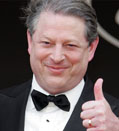 What a quick look at the history of the office since John Adams became the first Vice President of the United States in 1789 suggests is that there has been considerable constitutional room, so to speak, to develop and elaborate on the job, as circumstances may have seemed to require. It may well be that especially since 9/11/2001 Dick Cheney has done more than anyone else in this direction. Yet whatever else we may think about what he has done, in pushing the job to new heights he does not seem to have unambiguously gone beyond the Constitution. (On other grounds indeed, he may well qualify for and deserve impeachment, along with President George W. Bush himself – certainly even more than President Clinton, e.g. But that is another kind of matter.)
What a quick look at the history of the office since John Adams became the first Vice President of the United States in 1789 suggests is that there has been considerable constitutional room, so to speak, to develop and elaborate on the job, as circumstances may have seemed to require. It may well be that especially since 9/11/2001 Dick Cheney has done more than anyone else in this direction. Yet whatever else we may think about what he has done, in pushing the job to new heights he does not seem to have unambiguously gone beyond the Constitution. (On other grounds indeed, he may well qualify for and deserve impeachment, along with President George W. Bush himself – certainly even more than President Clinton, e.g. But that is another kind of matter.)
Finally, with regard to “Vice President Cheney’s recent declaration that he is not part of the executive branch,” the ultimate logic here is apparently that, along with being a potential president in waiting, the vice president is also “president of the Senate.” What a US Senate website has to say on the general situation is at least somewhat intriguing:
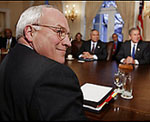 “During most of the nineteenth century, the degree of influence and the role played within the Senate [by the vice president] depended chiefly on the personality and inclinations of the individual involved. Some had great parliamentary skill and presided well, while others found the task boring, were incapable of maintaining order, or chose to spend most of their time away from Washington, leaving the duty to a president pro tempore. Some made an effort to preside fairly, while others used their position to promote the political agenda of the administration …
“During most of the nineteenth century, the degree of influence and the role played within the Senate [by the vice president] depended chiefly on the personality and inclinations of the individual involved. Some had great parliamentary skill and presided well, while others found the task boring, were incapable of maintaining order, or chose to spend most of their time away from Washington, leaving the duty to a president pro tempore. Some made an effort to preside fairly, while others used their position to promote the political agenda of the administration …
“During the twentieth century, the role of the vice president has evolved into more of an executive branch position. Now, the vice president is usually seen as an integral part of a president’s administration and presides over the Senate only on ceremonial occasions or when a tie-breaking vote may be needed. Yet, even though the nature of the job has changed, it is still greatly affected by the personality and skills of the individual incumbent.”
Will Bush actually replace Cheney to try to save his own legacy?
 Especially up here in the land of ice and snow (and even on an early summer day of “extreme heat alert”), it seems very difficult to judge just how serious US Republicans may be about getting rid of Vice President Cheney, in an effort to breathe some kind of last gasp of new life into the last 18 months of the perhaps almost tragic presidency of George W. Bush.
Especially up here in the land of ice and snow (and even on an early summer day of “extreme heat alert”), it seems very difficult to judge just how serious US Republicans may be about getting rid of Vice President Cheney, in an effort to breathe some kind of last gasp of new life into the last 18 months of the perhaps almost tragic presidency of George W. Bush.
Ms. Quinn’s reasons for replacing today’s particular tricky Dick with Fred Thompson seem to lay out the essential case: “Everybody loves Fred. He has the healing qualities of Gerald Ford and the movie-star appeal of Ronald Reagan. He is relatively moderate on social issues. He has a reputation as a peacemaker and a compromiser. And he has a good sense of humor … He could be just the partner to bring out Bush’s better nature … Not only that, Thompson would give the Republicans a platform for running for the presidency – and the president a way out of Iraq without looking like he’s backing down. Bush would be left in better shape on the war and be able to concentrate on AIDS and the environment in hopes of salvaging his legacy.”
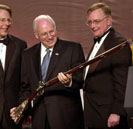 Against this are the views of something called The Carpetbagger Report: “Sally Quinn’s … reputation for being the social director of the Georgetown cocktail circuit is well deserved; Quinn’s columns tend to let readers know what Republican socialites in DC are chatting about … We’ve heard plenty of dump Cheney’ talk before, particularly in the run-up to the 2004 election, and all of it was kind of silly. And with 18 months left in the Bush presidency, I find it rather hard to believe we’ll see this kind of massive change …
Against this are the views of something called The Carpetbagger Report: “Sally Quinn’s … reputation for being the social director of the Georgetown cocktail circuit is well deserved; Quinn’s columns tend to let readers know what Republican socialites in DC are chatting about … We’ve heard plenty of dump Cheney’ talk before, particularly in the run-up to the 2004 election, and all of it was kind of silly. And with 18 months left in the Bush presidency, I find it rather hard to believe we’ll see this kind of massive change …
“Indeed, if this week’s Post series makes one thing clear, it’s that Cheney runs this White House and is responsible for Bush’s agenda. It’s the kind of dynamic that offers good job security … But Quinn’s column is interesting anyway. For one thing, it suggests the GOP establishment no longer has any use for the Bush White House. If Quinn is writing about it, Republicans in DC are talking about it … Cheney has helped undermine the GOP far more than the party probably realizes, but if Quinn’s right, the party’s insiders know something is amiss and they know Cheney bears some responsibility … I suspect every single Republican lawmaker on the Hill could go directly to the president and demand he make a change, and Bush would blow them off. But would a Cheney resignation help everyone? You bet.”
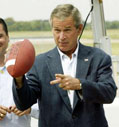 So who knows what is going to happen in the end? And good Democrats should no doubt be hoping that this particular tricky Dick stays around, to lend just the right atmosphere to the 2008 election. Whatever else, Vice President Cheney is a brilliant player of the Washington game. And he may even have developed Al Gore’s office of the vice president into something with a more enduring institutional future.
So who knows what is going to happen in the end? And good Democrats should no doubt be hoping that this particular tricky Dick stays around, to lend just the right atmosphere to the 2008 election. Whatever else, Vice President Cheney is a brilliant player of the Washington game. And he may even have developed Al Gore’s office of the vice president into something with a more enduring institutional future.
But if you are quite certain that his neanderthal policy choices – and his fundamental contempt for real democracy and all it seriously entails – have been disastrous for the current state of the free and democratic society, in both the USA and the rest of the global village today, even the mere thought that he might be thrown under the bus in disgrace by his own team does of course have an attractive side.
The Washington Post series
 Meanwhile, if you are left thirsting for still more on the subject, here is a quick guide to the series in the Washington Post:
Meanwhile, if you are left thirsting for still more on the subject, here is a quick guide to the series in the Washington Post:
ABOUT AND CHAPTERS:
About This Series … an in-depth investigation of the vice presidency of Dick Cheney… will examine Cheney’s largely hidden and little-understood role in crafting policies for the War on Terror, the economy and the environment :
A Different Understanding With the President … Sunday, June 24, 2007 ; Pushing the Envelope on Presidential Power … Monday, June 25, 2007 ; A Strong Push From Backstage … Tuesday, June 26, 2007 ; Leaving No Tracks … Wednesday, June 27, 2007.
SIDEBARS AND CHARACTERS
Protecting the President’s Power … ; Cheney’s Advice to Baker in 1980 … ; Expanding Authority for No. 2 Spot … ; Taking on the Supreme Court Case … ; Cast of Characters … Key Players in the Cheney series ; Bio and VP career overviews … photos and audio.
At the far edge of reason … the Ventriloquist Viceroy hypothesis?
 The very final and most radical quick historical point on the run is that Dick Cheney may have at least temporarily turned the office of Vice President of the United States into a kind of viceroy or even prime minister for a more symbolic President, who is (or was) essentially a communications specialist, good at exuding willful ideological commitment and attracting and reassuring certain strategic sections of the electorate but not too much else.
The very final and most radical quick historical point on the run is that Dick Cheney may have at least temporarily turned the office of Vice President of the United States into a kind of viceroy or even prime minister for a more symbolic President, who is (or was) essentially a communications specialist, good at exuding willful ideological commitment and attracting and reassuring certain strategic sections of the electorate but not too much else.
(Note the first definition of “Viceroy” in the Shorter Oxford English Dictionary: “One who acts as the governor of a country, province, etc., in the name and by the authority of the supreme ruler; a vice-king.” Arsenio Hall’s point that George W. Bush can’t speak when Dick Cheney is drinking a glass of water of course exaggerates the argument, but sums up its most extreme form succinctly, and memorably too.)
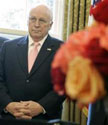 You can no doubt argue as well that the Cheney Viceroyalty is some kind of descendant of the extreme Imperial Presidency which the original tricky Dick, Richard Nixon, tried to bring to life in the early 1970s. Nixon had to resign as president because he pushed his concept beyond constitutional bounds – or at least so many will say. At least certain currents of opinion today seem to be hoping that something about the Cheney controversy in Washington has similar overtones. But the two cases are finally different.
You can no doubt argue as well that the Cheney Viceroyalty is some kind of descendant of the extreme Imperial Presidency which the original tricky Dick, Richard Nixon, tried to bring to life in the early 1970s. Nixon had to resign as president because he pushed his concept beyond constitutional bounds – or at least so many will say. At least certain currents of opinion today seem to be hoping that something about the Cheney controversy in Washington has similar overtones. But the two cases are finally different.
If Dick Cheney actually were to leave office on Sally Quinn’s scenario, e.g., it would be on what passed for broad policy not constitutional grounds. And, on a more subtle reading of the deeper story, Dick Cheney’s final legacy to American democracy may be to have shown that the Vice Presidency, like other aspects of the institutions bequeathed by the Philadelphia framers of the late 18th century, has constitutional room to grow in various directions.
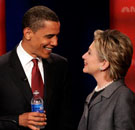 In more progressive and authentically democratic hands this could even prove a useful legacy. The fiction that the leadership of complex free and democratic societies can be usefully summarized in any one individual leader may be running its course in the early 21st century. (Just think, e.g., of the increasingly influential roles some living former US Presidents are playing in American public life today.)
In more progressive and authentically democratic hands this could even prove a useful legacy. The fiction that the leadership of complex free and democratic societies can be usefully summarized in any one individual leader may be running its course in the early 21st century. (Just think, e.g., of the increasingly influential roles some living former US Presidents are playing in American public life today.)
Not to put too fine a point on the message, Bush and Cheney have without doubt made a great mess of the concept, in various directions. But what if the new team was Clinton and Obama – with Vice President Obama forging his own more powerful and effective (and democratic) version of the office John Adams first took up in 1789?

